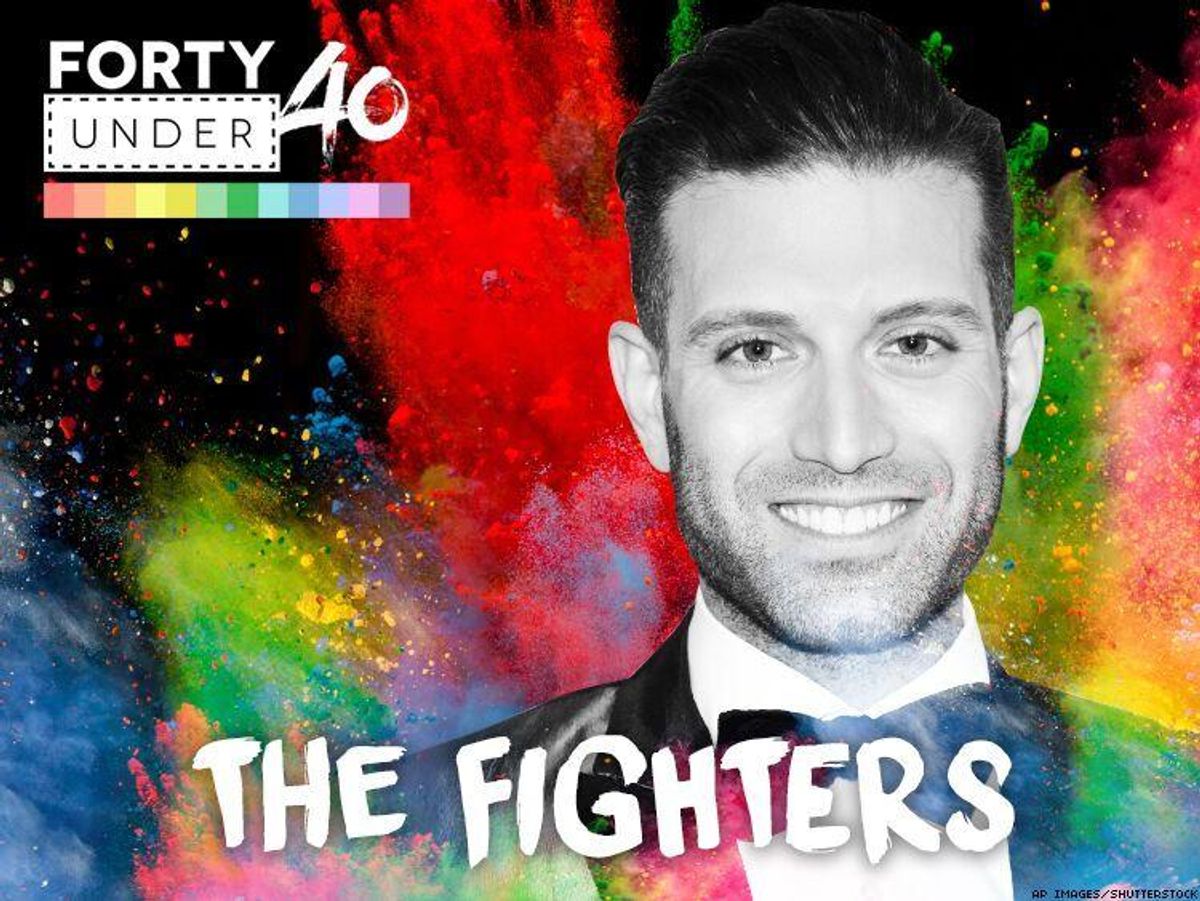To be Omar Sharif Jr. is to be privileged, yet obliged; to be loved, but also maligned. That's how it's gone for the actor-activist, 32, since coming out. It was a courageous act that made it necessary for the high-profile son of Egypt to flee his Cairo home to stay alive, whole, and free.
Sharif knows homophobia of a deadly variety. And should the Islamophobic policies of Republican presidential candidates such as Donald Trump become law, the proverbial American welcome mat that may have saved Sharif's life could be pulled out from under LGBT Muslims seeking refuge from ultraconservative countries where being gay is a death sentence.
But, says Sharif, that's just one way Islamophobia can hurt, even kill. The LGBT community has an opportunity, he argues, and a special obligation to combat Islamophobia.
He notes that Arabs and Muslim Americans face the same struggle that LGBT people faced for decades while overcoming stereotypes propagated by a different set of fearmongers in the media. LGBT people ought to remember, he says, that just as we want the mainstream to understand we come from all walks of life, political persuasions, cultures, occupations, and just about any other demographic segment one can imagine, so do Muslims.
"We only have to look back at the discrimination we've faced in our own struggle, and not put that on other minority groups," he says, adding that while terrorism and the AIDS crisis of the 1980s aren't similar, the backlash experienced by the LGBT community then and Muslim Americans now have striking similarities. Indeed, Sharif sees an opportunity for LGBT people to not only relate to Muslim Americans' struggle, but also to be allies.
"We faced a huge backlash of demonization in the 1980s when HIV/AIDS was coming to light," says Sharif. "Even though HIV/AIDS is not a gay disease, we and the disease were stereotyped. Now we need to not stereotype [Muslims and terrorism] in the same way."
This year Sharif Jr. was (perhaps naively) stunned and deeply hurt by sharp criticism levied at him by activist colleagues for the "sin" of defending two of his friends -- albeit two wealthy, bumbling ones who inexplicably saw Sen. Ted Cruz as part of a "movable middle," ripe for persuasion toward support of LGBT equality.
Ian Reisner and Mati Weiderpass, the owners of a popular Manhattan gay hotel and Fire Island night spot, took a drubbing in The New York Times and across the progressive mediasphere for hosting a reception at their home for Cruz, whose ideology is undeniably antigay and transphobic. Then Sharif was "retained" to do damage control on behalf of the hotel owners. Sharif contends he was never paid to speak up for Reisner and Weiderpass.
"It wasn't about rehabilitating their image or helping them that way," Sharif tells The Advocate. "One is a longtime friend who, when I moved here from Egypt and I didn't know where I was going to live, let me live in the Out Hotel until I got on my feet and figured out what I was going to do."
A former national spokesman for GLAAD, Sharif says his obligation to make a better world comes with the privilege of being the grandson of the two most famous and beloved Egyptian superstars, Faten Hamama, Sharif Jr.'s late, beloved grandmother, and his namesake, the late Hollywood megastar Omar Sharif -- who both died in 2015.
It turns out that Sharif, a product of a stratospheric upper class, is drawn to a political center that seems perpetually shrinking. Why is he so drawn to this place he loves to call the "movable middle?" Perhaps a better question is, Why has America become so repelled by the middle ground?
Is the shrinking of the middle class to blame for our seemingly intransigent polarity? Is the rarefaction of the middle responsible for the rise of American intolerance as represented by the rise of Trump?
Last summer's kerfuffle involving Cruz became a side argument about whether it's worth reaching across the political divide, especially to the usual enemies. But is there really a place where voters, opinion leaders, and politicians actually show up with open minds and movable opinions? Thinking only of Cruz and his Tea Party constituents, it's tempting to say no, there just isn't a "there" there.
Even after getting heat for defending friends who overreached toward what they thought was a movable middle, Sharif is now embarking on a new activism adventure, again seeking that fabled center land where opposed minds might meet. He wants a more accepting Middle East. But locale, history, and conservative religion all ensure his journey will be fraught. Sharif says he is committed to what he knows will be a decades-long effort.
Sharif looks for inspiration in his recent success helping to win the acquittal of 26 men imprisoned for debauchery following a televised raid on a Cairo bathhouse. Sharif is proud to have contributed by applying pressure with his media advocacy work, and aiding negotiations by holding one-on-one conversations with Egyptian diplomats and other officials.
Just last month, the sordid story ended in the arrest of Mona Iraqi, a television personality who instigated the bathhouse raid. Sharif has no qualms about her jailing by the government of President Abdel Fattah el-Sisi, whose regime is notorious for imprisoning journalists critical of his frequently brutal policies. According to Sharif, Iraqi is anything but a "controversial journalist," as she's been described.
"Mona al Iraqi is not controversial, she is criminal," he's been quoted as saying. "She committed crimes against the LGBT community, common decency, basic humanity, and journalistic integrity."
Following our interview, Sharif sent a message with some afterthoughts that revealed a certain maturity in terms of his own expectations and the limits of his ability to change the world.
"I don't pretend I can affect LGBT equality," he wrote. "Equality is a binary; it's all or nothing. Either we're fully equal or fully unequal. What I focus on is acceptance, which is a spectrum. There's a lot of gray area. And if I can move people one inch on that journey, that's my win.
"That's why we have to engage with the middle, the conservatives, and even the far right. They may never agree on marriage equality, but movement on believing youth shouldn't be made homeless or bullied in schools is still worthwhile change."


















































































